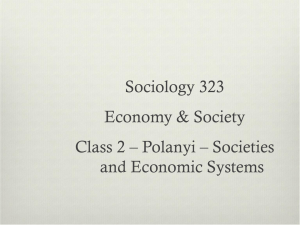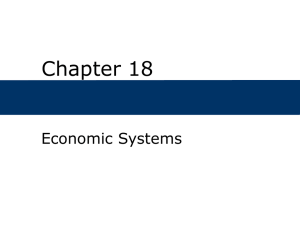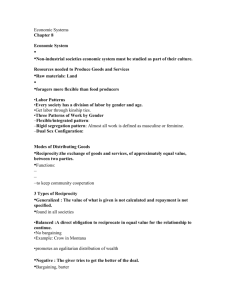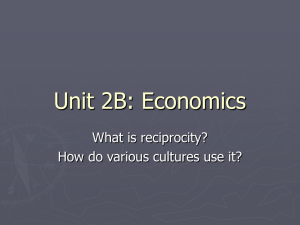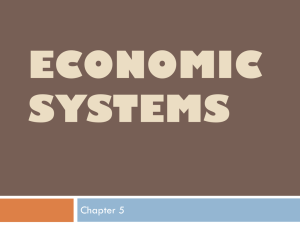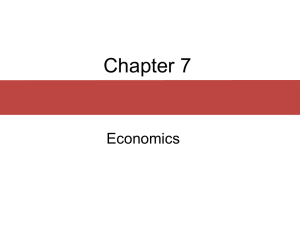Economic Systems Chapter 6
advertisement
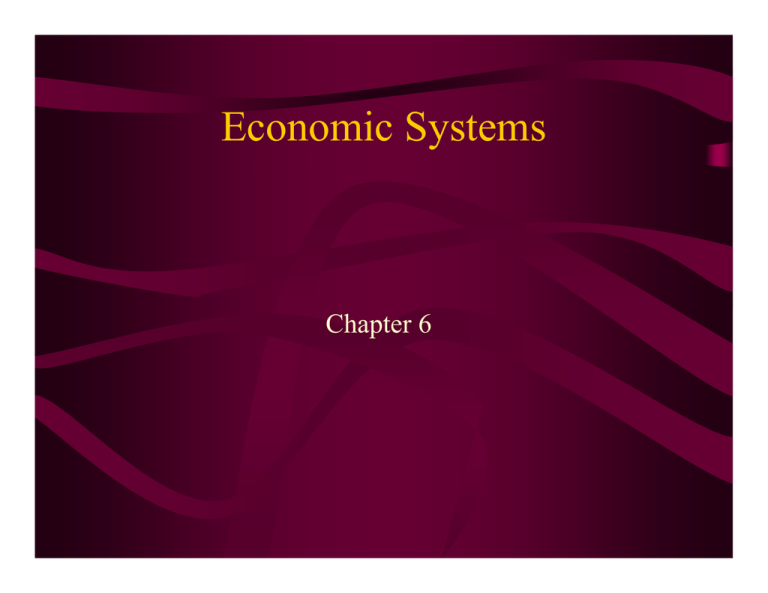
Economic Systems Chapter 6 The Science of Economics • Economics • ... The academic discipline that studies systems of production, distribution, and consumption, most typically in the industrialized world. Science of Economics - Cont’d • Economic Anthropology • …a branch of the discipline of anthropology that looks at systems of production, distribution, and consumption most often in the nonindustrialized world. Exchange Theory • George Homans - “Exchange Theory” • Exchange Relationships • …self interest is the universal motive behind the way people behave toward one another. Schools of Economics • Substantivist • …hold the position that classical economic theories cannot be applied to the study of nonindustrialized societies. • What is meant by “Classical Economic Theory?” Schools of Economics - Cont’d • Formalist • …the concepts of Western economics are appropriate for the study of any economic system provided they are broadened. • Broadened to include what? Schools of Economics - Cont’d • To include (relating to small-scale societies): • …motivation to maximize their standing in the community. • …their physical security. • …the breath of their social networks. Cross-Cultural Analysis of Economic Systems • Economic Dimensions considered: • • • The Regulation of Natural Resources Production Distribution/Exchange Economic Dimensions - Cont’d • Regulation/Allocation of Natural Resources • • • • Food Collectors Pastoralists Horticulturalists Industrial Economic Dimensions - Cont’d • Production • …the process of obtaining goods from the natural environment and transforming them into usable objects. • Modes of Production • Role of Cultural Values- (Piraha, India, etc.) Dimensions of Production • • • • • • Nonindustrial / Industrial Units of Production Division of Labor Gender Specialization Task Allocation by Age Labor Specialization Units of Production • Industrial Society • Business is primary unit of production. • Business must rely on large number of workers. (specialized) • Business specializes as an economic function and is more productive. • Non Industrial Soc. • Household shares certain religious, political & social activities. • Household is selfsufficient. • More than productive unit-emotional,social, • psych & spiritual. Distribution of Goods and Services • Reciprocity - Types: • Generalized Reciprocity • …a form of gift giving without any expectation of immediate return. • Examples within different types of societies- Distribution: Reciprocity • Balanced Reciprocity : • …is a form of exchange involving the expectation that goods and services or equivalent value will be returned within a specified period of time. Distribution: Reciprocity • Negative Reciprocity• …is a form of exchange between equals in which the parties attempt to take advantage of each other. Distribution: Redistribution • Redistribution - (Redistributional Economic Exchange) • …goods are given to a central authority and then given back to the people in a new pattern. • (…the predominant form of economic exchange in chiefdom societies, and one that is not usually found in tribal societies) Distribution: Redistribution • • • • TributeBig Men/Feast GiversBridewealthPotlatch- Types of Redistribution • Tribute• Tribal chief is given food and other material goods by tribal members and the items are given back to the people in the form of a feast. Tribute • • • • FunctionsMechanism for dispensing of goods. Affirms political power of the Chief. Demonstrates solidarity among the people. Types of Redistribution • Bigmen/Feast Givers• Self-made leaders who are able to convince their relatives/neighbors to contribute surplus goods for the sake of community wide feasting. • (Usually in less centralized societies that do not have formal chiefs) Types of Redistribution • Bridewealth• The transfer of commodities/goods from the groom’s family (lineage) to the bride’s family (lineage) as a precondition for marriage. Types of Redistribution • Potlatch• A feast among (Northwest Coast Indians) at which great quantities of food and goods are given to the guests in order to gain prestige for the host(s). (A form of competitive giveaway.) Distribution: Market Exchange • Market (Commercial) Exchange• …referring to exchanges or transactions in which the “prices” are subject to supply and demand. • (Buying and selling of goods, labor, land, rentals, and credit) Standardized Currency--- General-purpose money/Special purpose money
